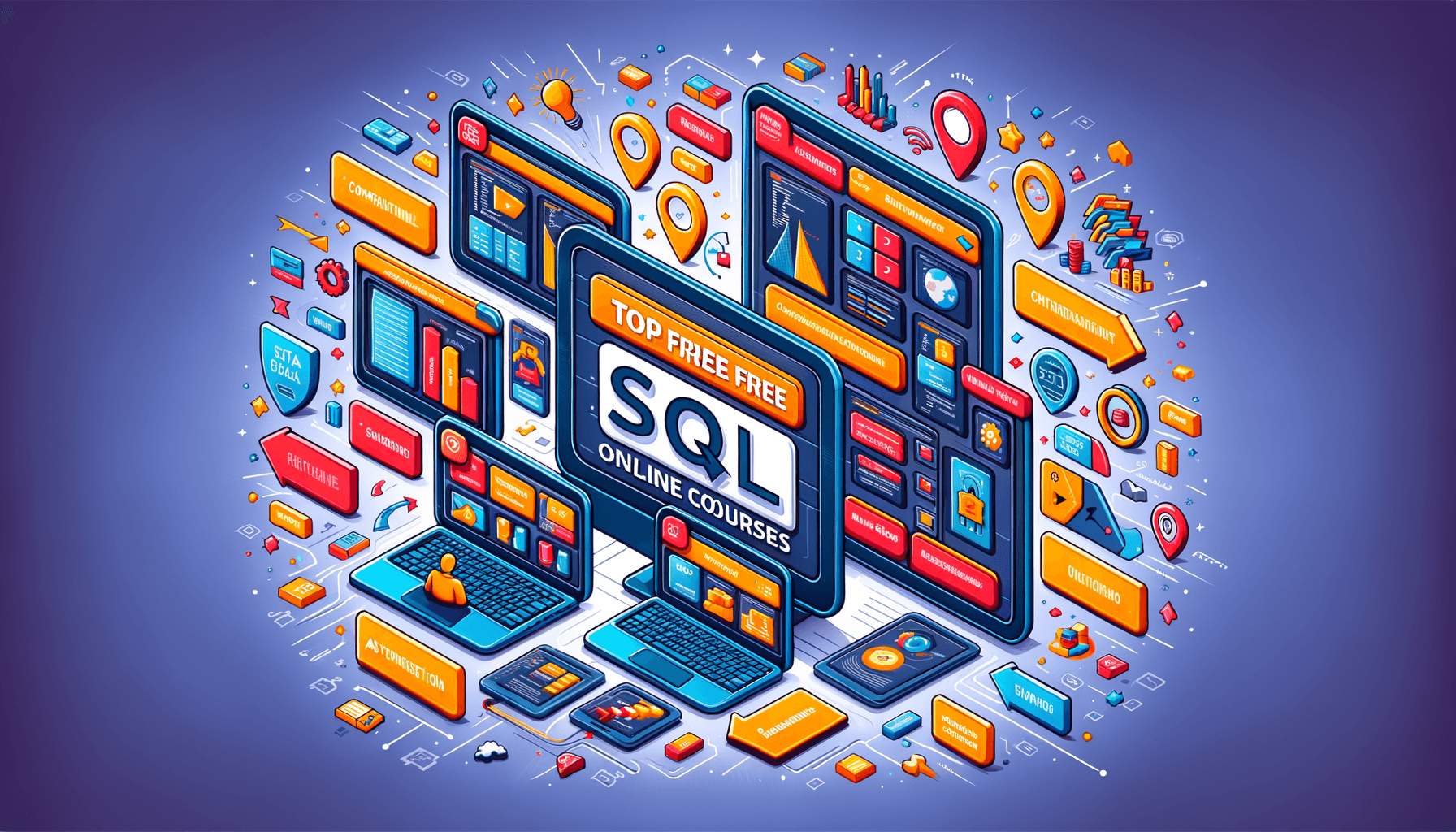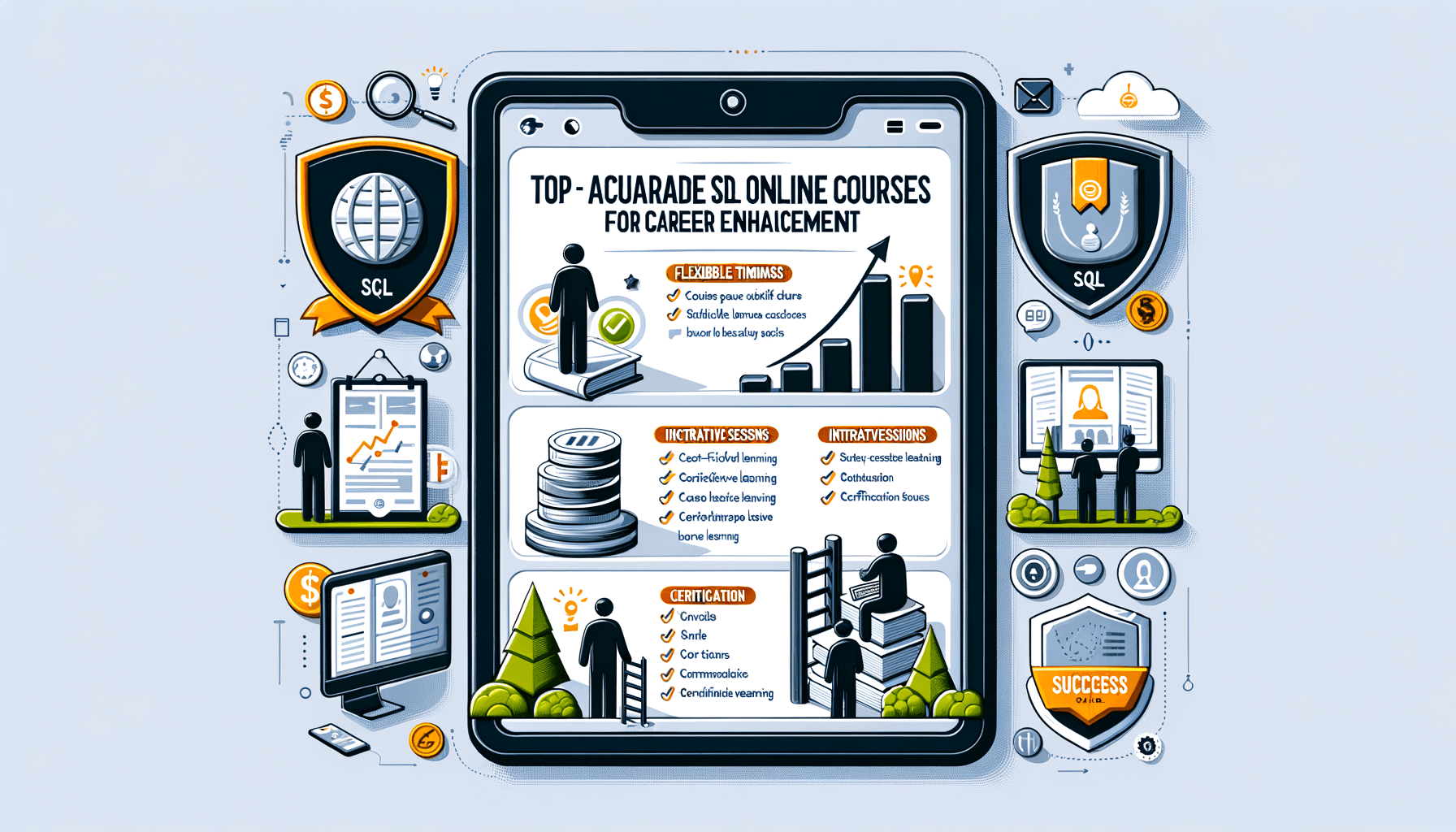A big variety of articles and resources

How to get a job doing SQL?
 Sia Author and Instructor
Learn SQL
Sia Author and Instructor
Learn SQL
12 minute read
Getting a job that involves SQL can be a great way to start or advance your career in data management. SQL, or Structured Query Language, is the go-to language for managing and manipulating databases. This article will guide you through the steps you need to take to learn SQL, gain practical experience, build a strong resume, and ace your job interviews. Whether you're just starting out or looking to improve your skills, this guide will help you navigate the job market and land an SQL job.
Key Takeaways
- SQL is crucial for managing and analyzing data in various industries.
- You can learn SQL through formal education, online courses, or self-study.
- Hands-on projects and internships are important for gaining practical experience.
- A strong resume should highlight your SQL skills and practical experience.
- Networking and continuous learning are vital for staying updated in the field.
Understanding SQL and Its Importance in the Job Market
Defining SQL
Structured Query Language (SQL) is a standard language used to manage and manipulate databases. It allows us to create, read, update, and delete data stored in a database. SQL is essential for anyone working with data because it provides a way to interact with large datasets efficiently.
The Role of SQL in Data Management
SQL plays a crucial role in data management by enabling users to organize and retrieve data quickly. It is used in various applications, from business analytics to web development. The zero to MySQL junior DBA course offers practical SQL training with real-world problem-solving, making it easier for beginners to grasp the concepts.
Industry Demand for SQL Skills
The demand for SQL skills is high across many industries. Companies need professionals who can manage and analyze data to make informed decisions. Instructor Eric Vanier provides expertise in MySQL performance optimization and data management, which are highly sought-after skills in the job market.
Understanding SQL and its applications can open many doors in your career. Whether you're looking to work in tech, finance, or healthcare, SQL skills are valuable and often required.
Educational Pathways to Mastering SQL
Formal Education Options
Pursuing a degree in computer science or information technology can provide a solid foundation in SQL. Many universities offer courses that cover SQL basics and advanced topics. These programs often include hands-on labs and projects, which are essential for mastering SQL.
Online Courses and Certifications
Online platforms offer a variety of courses that allow you to fit data & SQL skills into your busy life. These micro-courses are perfect for beginners and let you learn at your own pace. Many of these courses are free or require a small fee, making them accessible to everyone.
Self-Study Resources
For those who prefer a more flexible approach, self-study resources are a great option. There are numerous books, tutorials, and forums available online. These resources allow you to dive deep into SQL topics and practice at your own speed. No credit card required, just login or sign up to start learning.
Mastering SQL requires dedication and practice. Choose the pathway that best fits your learning style and schedule.
Building a Strong Foundation in SQL
Basic SQL Concepts
To start with SQL, we need to understand the basics. This includes learning about tables, rows, and columns. We should also get familiar with simple commands like SELECT, INSERT, UPDATE, and DELETE. These commands help us manage and manipulate data in a database. For those new to SQL, the sqlskillz.com - sqlmicro course: essentials course is a great place to begin. It offers real-world projects that make learning practical and fun.
Intermediate SQL Techniques
Once we have a good grasp of the basics, we can move on to more advanced topics. This includes learning about JOINs, which allow us to combine data from multiple tables. We should also explore subqueries and aggregate functions like COUNT, SUM, and AVG. These techniques help us perform more complex queries and get deeper insights from our data.
Advanced SQL Practices
For those looking to master SQL, it's important to learn advanced practices. This includes understanding indexing, which can make our queries run faster. We should also learn about stored procedures and triggers, which help automate tasks in the database. By mastering these advanced techniques, we can become more efficient and effective in managing data.
Building a strong foundation in SQL is essential for anyone looking to work with data. By starting with the basics and gradually moving to more advanced topics, we can gain the skills needed to succeed in the tech industry.
Practical Experience and Hands-On Projects
Internships and Entry-Level Positions
Gaining practical experience is crucial for mastering SQL. Internships and entry-level positions offer a great way to apply what we've learned in real-world settings. These roles often provide exposure to various database management tasks, allowing us to understand how SQL is used in different industries. Internships can be a stepping stone to more advanced positions, giving us the chance to build a solid foundation in SQL.
Personal Projects and Portfolios
Working on personal projects is another effective way to gain hands-on experience. By creating our own databases and writing complex queries, we can deepen our understanding of SQL. These projects can be showcased in a portfolio, demonstrating our skills to potential employers. A well-organized portfolio can make a significant difference in job applications, highlighting our ability to handle real-world data challenges.
Collaborative Projects and Hackathons
Participating in collaborative projects and hackathons can also enhance our SQL skills. These events often involve teamwork and problem-solving, providing a platform to learn from others and tackle complex data issues. Hackathons are particularly beneficial as they simulate real-world scenarios, pushing us to think creatively and apply our SQL knowledge under time constraints.
Engaging in hands-on projects and practical experiences is essential for mastering SQL. It not only helps us apply theoretical knowledge but also prepares us for the challenges of the job market.
Crafting an Effective SQL-Focused Resume
Highlighting Relevant Skills
When crafting a resume for an SQL job, it's crucial to showcase your skills clearly. Make sure to list all the SQL-related skills you have, such as writing queries, data analysis, and database management. Including specific tools and technologies you are familiar with, like MySQL, PostgreSQL, or SQL Server, can also be beneficial.
Showcasing Practical Experience
Employers value hands-on experience. Highlight any internships, entry-level positions, or personal projects where you used SQL. For instance, if you completed a mini course: sql query crafting, mention it. This shows you have practical knowledge and are ready to apply it in real-world scenarios.
Tailoring the Resume for Specific Roles
Each job is unique, so tailor your resume to fit the specific role you are applying for. Focus on the skills and experiences that are most relevant to the job description. This can make your resume stand out to hiring managers and increase your chances of getting an interview.
Remember, a well-crafted resume is your first step towards landing an SQL job. Make sure it reflects your skills and experiences accurately and effectively.
Preparing for SQL Job Interviews
When we prepare for SQL job interviews, we must focus on several key areas to ensure we present ourselves as strong candidates. Understanding common SQL interview questions is crucial, as these often cover fundamental concepts and practical applications of SQL. We should expect questions that test our knowledge of database design, query optimization, and data manipulation.
To help us prepare, we can categorize the types of questions we might face:
- Basic SQL Questions: These may include topics like SELECT statements, JOIN operations, and WHERE clauses.
- Intermediate SQL Questions: Here, we might encounter questions about subqueries, indexes, and stored procedures.
- Advanced SQL Questions: These could involve complex queries, performance tuning, and database normalization.
In addition to technical questions, we should also be ready for behavioral interview questions. These questions often assess our problem-solving skills and how we work in a team. We can prepare by reflecting on our past experiences and how they relate to the job we are applying for.
| Question Type | Examples |
|---|---|
| Basic SQL Questions | What is a JOIN? What does GROUP BY do? |
| Intermediate SQL Questions | Explain a subquery. What is an index? |
| Advanced SQL Questions | How do you optimize a query? What is normalization? |
Preparing for interviews is not just about answering questions; it’s also about demonstrating our passion for SQL and our eagerness to learn.
By practicing these questions and reflecting on our experiences, we can approach our SQL job interviews with confidence and clarity. Ultimately, our goal is to showcase our SQL skills and our ability to contribute to the team.
Networking and Professional Development
Joining SQL and Data Communities
To grow in our SQL careers, we should join SQL and data communities. These groups offer a chance to meet others who share our interests. We can learn from their experiences and get advice. Being part of a community helps us stay updated with the latest trends and tools in SQL.
Attending Industry Conferences and Meetups
Going to industry conferences and meetups is another great way to network. These events let us hear from experts and see new technologies. We can also meet potential employers or collaborators. It's a good idea to attend at least one conference or meetup each year to keep our skills sharp.
Leveraging LinkedIn and Professional Networks
LinkedIn is a powerful tool for building our professional network. We should connect with colleagues, join relevant groups, and share our achievements. This can help us find job opportunities and stay informed about industry news. Personalized support from our network can be invaluable when looking for new roles or projects.
Networking is not just about meeting people; it's about building relationships that can help us grow in our careers.
Staying Updated with SQL Trends and Technologies
Continuous Learning and Skill Development
To stay ahead in the SQL field, we must continuously learn and develop our skills. This means regularly taking courses, reading articles, and practicing new techniques. There are many AI-supported courses available that can help us keep up with the latest advancements in SQL and other related technologies.
Exploring New SQL Tools and Platforms
The SQL landscape is always changing, with new tools and platforms emerging regularly. We should explore these new tools to understand their benefits and how they can improve our work. By doing so, we can stay competitive and efficient in our roles.
Adapting to Industry Changes
The tech industry is fast-paced, and SQL is no exception. We need to be adaptable and ready to learn new methods and technologies as they become relevant. This adaptability will ensure we remain valuable assets in our field.
Staying updated with SQL trends and technologies is crucial for our professional growth and success. By continuously learning, exploring new tools, and adapting to changes, we can maintain our edge in the job market.
Navigating the Job Search Process
Identifying Job Opportunities
When looking for SQL jobs, we should start by identifying the right opportunities. Websites like LinkedIn, Indeed, and Glassdoor are great places to begin. We can also check company websites directly for openings. Networking can also help us find hidden job opportunities that aren't advertised online.
Applying for SQL Positions
Once we find a job that fits, it's time to apply. Tailoring our resume and cover letter to each job is crucial. We should highlight our SQL skills and any relevant experience, like an introduction to SQL course. This shows employers that we have the skills they need.
Following Up and Negotiating Offers
After applying, following up with the employer can make a big difference. A simple email to check on the status of our application shows that we are interested. If we get an offer, it's important to negotiate. We should consider the salary, benefits, and other perks before accepting. This ensures we get the best deal possible.
Remember, the job search process can be long and challenging, but staying persistent and positive will help us succeed.
Looking for a job can be tough, but we're here to help! Visit our website to explore resources that can make your job search easier. From resume tips to interview advice, we've got you covered. Don't miss out on our expert guidance. Check out our blog for more information.
Conclusion
Getting a job in SQL requires a mix of learning, practice, and networking. Start by understanding the basics of SQL and then move on to more advanced topics. Practice regularly by working on real-world projects or using online platforms. Networking is also key; connect with professionals in the field through social media or local meetups. By following these steps, you'll be well on your way to landing a job in SQL.
Frequently Asked Questions
What is SQL and why is it important?
SQL stands for Structured Query Language. It is used to manage and manipulate databases. Companies use SQL to handle large amounts of data.
What are the basic concepts of SQL?
Basic concepts include understanding tables, rows, and columns. You also need to know how to use commands like SELECT, INSERT, UPDATE, and DELETE.
Do I need a college degree to learn SQL?
No, you don't need a college degree. There are many online courses, tutorials, and books that can teach you SQL.
What types of jobs require SQL skills?
Jobs like data analyst, database administrator, and software developer often require SQL skills. Many other tech jobs also look for SQL knowledge.
How can I get practical experience in SQL?
You can work on personal projects, join hackathons, or get internships. Building a portfolio of your work can also help.
What should I put on my resume for an SQL job?
Highlight your SQL skills, any projects you've worked on, and any relevant experience. Tailor your resume to match the job you're applying for.
How should I prepare for an SQL job interview?
Practice common SQL interview questions and problems. Be ready for technical tests and also prepare for behavioral questions.
How can I stay updated with the latest in SQL?
Join online communities, attend industry meetups, and keep learning new tools and techniques. Staying updated will help you stay competitive.
Related Articles

Find the Best SQL Online Course for Free Today
9 minute read

Is it worth learning SQL and Tableau?
14 minute read





